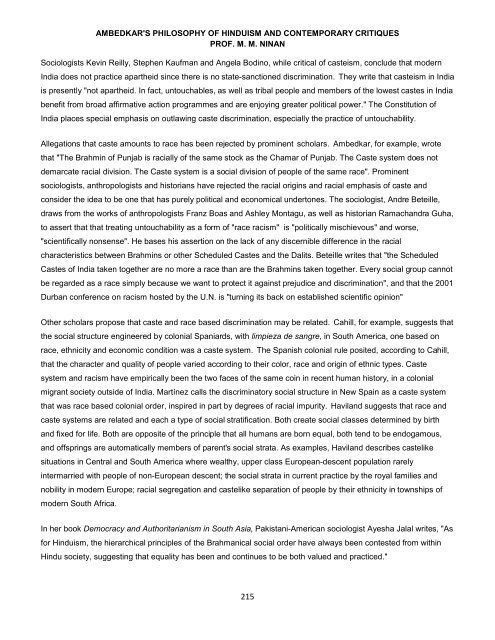Ambedkar-Philosophy of Hinduism
Create successful ePaper yourself
Turn your PDF publications into a flip-book with our unique Google optimized e-Paper software.
AMBEDKAR'S PHILOSOPHY OF HINDUISM AND CONTEMPORARY CRITIQUES<br />
PROF. M. M. NINAN<br />
Sociologists Kevin Reilly, Stephen Kaufman and Angela Bodino, while critical <strong>of</strong> casteism, conclude that modern<br />
India does not practice apartheid since there is no state-sanctioned discrimination. They write that casteism in India<br />
is presently "not apartheid. In fact, untouchables, as well as tribal people and members <strong>of</strong> the lowest castes in India<br />
benefit from broad affirmative action programmes and are enjoying greater political power." The Constitution <strong>of</strong><br />
India places special emphasis on outlawing caste discrimination, especially the practice <strong>of</strong> untouchability.<br />
Allegations that caste amounts to race has been rejected by prominent scholars. <strong>Ambedkar</strong>, for example, wrote<br />
that "The Brahmin <strong>of</strong> Punjab is racially <strong>of</strong> the same stock as the Chamar <strong>of</strong> Punjab. The Caste system does not<br />
demarcate racial division. The Caste system is a social division <strong>of</strong> people <strong>of</strong> the same race". Prominent<br />
sociologists, anthropologists and historians have rejected the racial origins and racial emphasis <strong>of</strong> caste and<br />
consider the idea to be one that has purely political and economical undertones. The sociologist, Andre Beteille,<br />
draws from the works <strong>of</strong> anthropologists Franz Boas and Ashley Montagu, as well as historian Ramachandra Guha,<br />
to assert that that treating untouchability as a form <strong>of</strong> "race racism" is "politically mischievous" and worse,<br />
"scientifically nonsense". He bases his assertion on the lack <strong>of</strong> any discernible difference in the racial<br />
characteristics between Brahmins or other Scheduled Castes and the Dalits. Beteille writes that "the Scheduled<br />
Castes <strong>of</strong> India taken together are no more a race than are the Brahmins taken together. Every social group cannot<br />
be regarded as a race simply because we want to protect it against prejudice and discrimination", and that the 2001<br />
Durban conference on racism hosted by the U.N. is "turning its back on established scientific opinion"<br />
Other scholars propose that caste and race based discrimination may be related. Cahill, for example, suggests that<br />
the social structure engineered by colonial Spaniards, with limpieza de sangre, in South America, one based on<br />
race, ethnicity and economic condition was a caste system. The Spanish colonial rule posited, according to Cahill,<br />
that the character and quality <strong>of</strong> people varied according to their color, race and origin <strong>of</strong> ethnic types. Caste<br />
system and racism have empirically been the two faces <strong>of</strong> the same coin in recent human history, in a colonial<br />
migrant society outside <strong>of</strong> India. Martínez calls the discriminatory social structure in New Spain as a caste system<br />
that was race based colonial order, inspired in part by degrees <strong>of</strong> racial impurity. Haviland suggests that race and<br />
caste systems are related and each a type <strong>of</strong> social stratification. Both create social classes determined by birth<br />
and fixed for life. Both are opposite <strong>of</strong> the principle that all humans are born equal, both tend to be endogamous,<br />
and <strong>of</strong>fsprings are automatically members <strong>of</strong> parent's social strata. As examples, Haviland describes castelike<br />
situations in Central and South America where wealthy, upper class European-descent population rarely<br />
intermarried with people <strong>of</strong> non-European descent; the social strata in current practice by the royal families and<br />
nobility in modern Europe; racial segregation and castelike separation <strong>of</strong> people by their ethnicity in townships <strong>of</strong><br />
modern South Africa.<br />
In her book Democracy and Authoritarianism in South Asia, Pakistani-American sociologist Ayesha Jalal writes, "As<br />
for <strong>Hinduism</strong>, the hierarchical principles <strong>of</strong> the Brahmanical social order have always been contested from within<br />
Hindu society, suggesting that equality has been and continues to be both valued and practiced."<br />
215


















